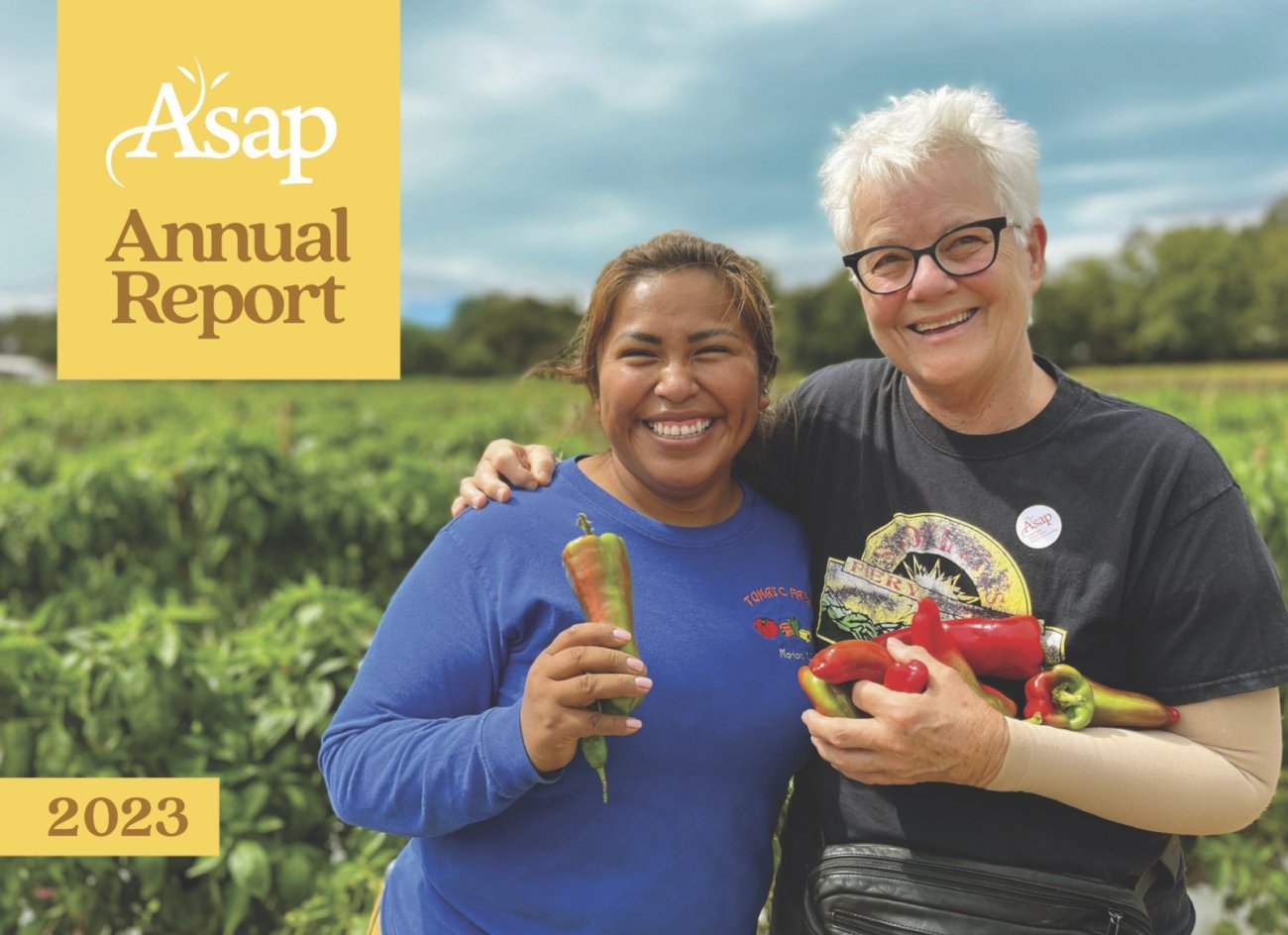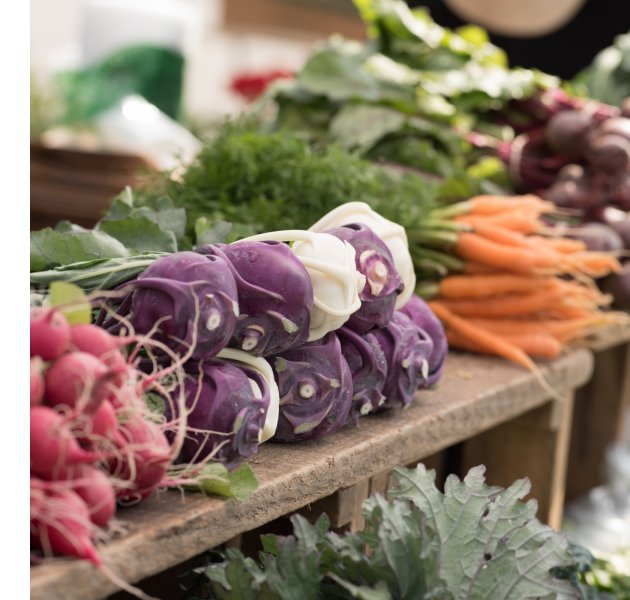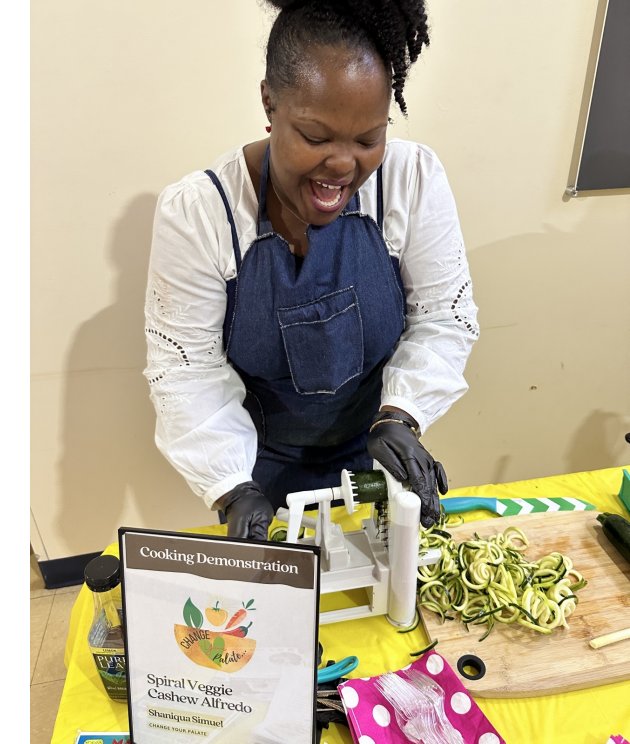|
|
|
monthly news from ASAP | MARCH 2024 | asapconnections.org
|
| |
|
|
ASAP's 2023 Annual Report
|

ASAP's 2023 Annual Report looks back on at the past year through the voices of some of the farmers, educators, local food shoppers, and other food system partners we've worked with. Through these stories, we can see the impact of ASAP's farmer support services, engagement with schools and early care centers, and local food access programs, like Farm Fresh Produce Prescription.
"Forty dollars in my pocket became health for me and my baby, and then became income for farmers," says Lauren, a prescription program participant who was first referred through the Nurse-Family Partnership when she was pregnant. "And now I will be able to take my baby with me to the market. It puts money in my hands and because it's restricted to fruits and vegetables, it gives me only healthy choices. There are things we wouldn't eat in our household without this program."
The report also features Haywood County Schools Nutrition Director Alison Francis, who works with ASAP to procure local food and provide farm connections for the students; Danielle Hutchison, co-owner of TendWell Farm, who ASAP connected with Buncombe County Schools to sell their produce; and farmers Mark McDonagh and Danielle Keeter of Mighty Gnome Market Garden, who have fostered several lasting community relationships through ASAP connections, including with Haywood Christian Ministry's food pantry, Haywood's Historic Farmers Market, and the City of Asheville.
The annual report also includes program impact data and a financial overview of the organization. Read it in full.
|
|
 |
Farmers Markets Open for the Season
|

Farmers markets are opening throughout April and May—or, for year-round markets, shifting back to regular season hours. Spring markets offer an array of produce as well as meat, cheese, eggs, bread, prepared foods, and a wide selection of plant starts. For a weekly report on what's fresh at markets, subscribe to our weekly market report newsletter!
In addition to operating Asheville City Market, ASAP offers promotional and technical support for farmers markets throughout the region. ASAP’s Double SNAP for Fruits and Vegetables and Farm Fresh Produce Prescription programs will continue in 2024 and expand access to fresh fruits and vegetables to more people in the community that might not otherwise be able to afford them.
There are more than 100 farmers markets across the Appalachian Grown region. Search for all of these markets by location, SNAP access, and more in ASAP’s online Local Food Guide at appalachiangrown.org.
|
|
 |
 FACES OF LOCAL FACES OF LOCAL |
| | 
Kiera Bulan is the Sustainability Manager for the City of Asheville and partners with ASAP on the intersections of our work, and to promote local food options for City employees.
As the Sustainability Manager for the City of Asheville, what are some of the projects you’re working on?
So many different areas! Our department focuses on four main “buckets” of work with plenty of collaborative projects living under each. Our primary buckets are: Climate, Energy, Food, and Waste Reduction. Within those areas we focus on both internal operations and community-facing initiatives. Some key activities this year: With our Climate Justice Initiative we’re working to refine, share, and co-create climate actions, conversations, and data to support neighborhood and climate resilience. We use a Climate Justice Data Map for internal operations (but it’s also available to the community). We’re also in a current phase of community listening and conversation sparks to build up a revised personal climate resource guide!
What is Food Waste Reduction Month and how can people participate?
April is Food Waste Reduction Month! Beginning in 2021 the City of Asheville and Buncombe County have been proactively working to engage and inform residents of the important climate impacts of food waste reduction. Through our food scraps drop-off program (eight sites around the city and county where residents can drop off their organic matter) and hosting formal and informal educational and networking events in collaboration with Food Waste Solutions WNC, we encourage residents to take action to be mindful of the waste they’re creating and to compost what scraps they create. Our website has info on how to backyard compost as well as info on how to sign up for the (free!) city and county program to drop off your food scraps at locations around town. Follow @wncfoodwaste for more ideas on how to participate!
April is also the month many farmers markets start opening in our area. How can shopping locally go hand in hand with reducing food waste?
So many ways! Fresher food lasts longer, and food can’t be any fresher than straight from our local farmers. When residents are thoughtfully purchasing fresh food there’s a good chance that more of those products will go right where they belong, into our meals and bodies. Additionally, so many farmers markets and brilliant farmers offer value adds like tips and tricks on what to do with these market gems, so customers are less at risk for purchasing something and forgetting about it in the back of the fridge. Shoppers come home inspired and cook up that good food!
Do you have favorite recipes or tricks for using up lots of leftover greens? (At this time of year, it’s usually greens, right?)
Greens, yes! Or storage crops… Most of my go to’s around any food on the brink is soup! But that’s especially true of greens. I love a sausage, tomato, kale soup. I use last year’s tomatoes fresh from the freezer. I’m lazy, so I freeze them whole and defrost them in a bowl of hot water. Then some nice bulk sausage fried up with all the aromatics—onions, garlic, maybe some ginger if you’re feeling spicy, along with an ample dose of oregano and some thyme. Yum! Also, storage crops are still so good. Some farmers are diggin’ up their fall-planted sweetest of sweet carrots, which of course are best fresh. But those carrot tops can join potato peels, onion, and garlic skins, greens ribs, and any other “scraps” in a big old stock pot to simmer for a few hours and then can be frozen in ice cube trays to have instant veggie stock for your next cooking project. THEN you can compost those scraps!
|
|
|
|
 RECIPE OF THE MONTH RECIPE OF THE MONTH |
|
Spiral Veggie Cashew Alfredo
|
| 
We hosted ASAP's annual CSA Fair on March 10 and Shaniqua Simuel joined us again this year for a cooking demo. Shaniqua is the founder of Change Your Palate, a whole-food meal preparation program, and coordinator for Shiloh Community Garden. We're sharing the recipe she sampled, which can easily be adapted for whatever produce is in season.
Serves 3-4
Ingredients
- 2 zucchini, spiralized
- 2 sweet potatoes, spiralized
- 1 cup spinach, chopped
- 1/2 cup diced mushrooms
- 1 cup of raw cashews
- 1/4 cup sliced scallions
- 1/2 fresh squeezed lemon
- 2 tablespoons olive oil
- 1 tablespoon nutritional yeast
- 1 tablespoon garlic powder
- 1/2 tablespoon onion bullion
- 1/4 teaspoon black pepper
- 1/4 teaspoon red pepper
- pinch of salt
- Sprinkle of shredded Parmesan (optional)
Directions
-
Boil cashews with 2.5 cups of water for about 15 to 20 mins until they are soft and bendable. Reserve the boiling liquid.
-
Toss spiralized veggies with oil and a pinch of salt.
-
Sauté spiraled veggies in a skillet pan for about 3 to 4 minutes.
-
Add in mushrooms and sauté for 3 to 4 minutes. Add spinach last and cook for about 2 minutes. Turn off heat.
-
Drain water off of Cashews reserving one cup of the water
-
Add to a blender with spices, onion bullion, lemon juice, and 1/2 cup of cashew liquid. Blend until desired creaminess. Add more water as needed.
-
Pour sauce on veggies, garnish with scallions and Parmesan, if using. Voila!
Find more recipes at growing-minds.org and asapconnections.org.
|
|
|
|
 MEDIA HIGHLIGHTS MEDIA HIGHLIGHTS |
| "Across the region, initiatives like the Appalachian Sustainable Agriculture Project are strengthening the farm-to-table pipeline between local growers and restaurants, while a host of farm schools and culinary guilds cultivate future generations of Appalachian food stewards."
“Growing Minds’ mission is to help farm-to-school and farm-to-early-childhood programs thrive by building the capacity of educators, nutrition staff, caregivers and farmers. Our new ["I Tried Local..."] toolkit will engage these leaders so that they, in turn, can inspire the next generation with local food and farms in the classroom, cafeteria and community.”
|
|
|
|
|
|
|
| | |
ASAP's mission is to help local farms thrive, link farmers to markets and supporters, and build healthy communities through connections to local food.
|
|
|
|
|
|
|
|
|
|
|